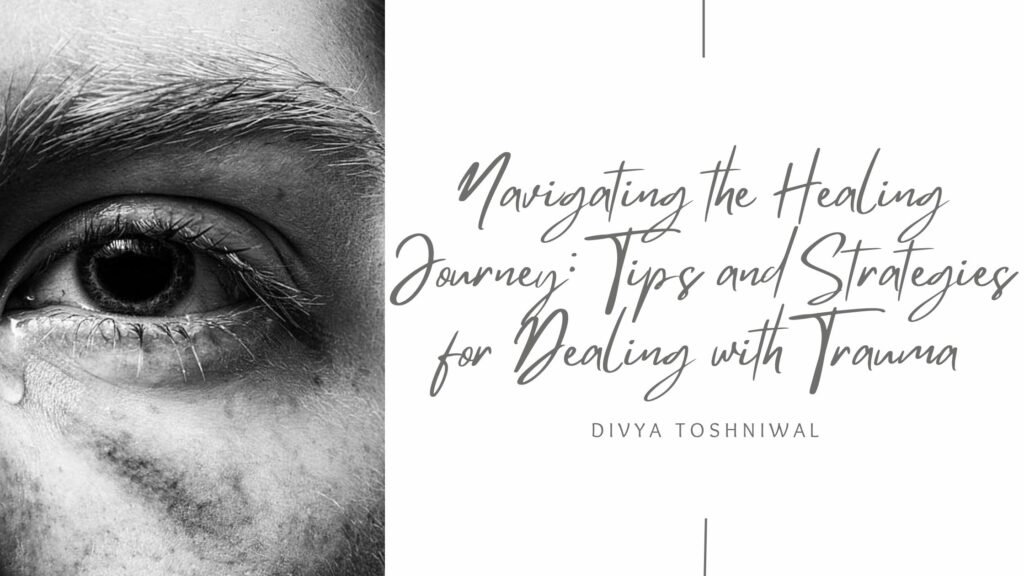Trauma can happen to anyone and everyone. In fact, in life, most of us face at least one traumatic event. Whether it be a death of a loved one, a physical injury or accident, some natural disaster, or loss of finances and security. Any such event can cause trauma. But how a person reacts to trauma is different for each individual. Every person has their own strategies for dealing with trauma
This article explores the cause of trauma, the signs of unhealed trauma, the psychological disorders that can be caused by trauma, and also the strategies for dealing with trauma.
Table of Contents
What Can Cause Trauma?
There can be a number of incidents that may be a cause of trauma for an individual. These incidents may be a one-time event or something that has built itself into trauma due to a continuously stressful environment. The following are some examples of what may be a cause of trauma:
- Abuse in any form, be it physical or emotional.
- Witnessing a violent event like war, terrorism, murder or so.
- Sudden loss of loved ones or a major financial setback.
- Witnessing or being a part of a traumatic event at work, such as a first responder or a healthcare worker
- Diagnosis of a life-threatening disease.
- Natural disasters, such as earthquakes or hurricanes
- Any accidents such as car accidents or plane crashes.
- Neglect or abuse during childhood leaves a lifelong impact.
What Are the Signs of Trauma?
The signs of trauma can vary for different individuals. The following story lists a few signs of unhealed trauma.
Psychological Issues Caused by Traumatic Events
Traumatic events may lead to a number of psychological issues. These issues can be for a temporary phase but sometimes they may also leave an impact for a lifetime.
- Depression: Trauma can lead to depression by altering the way the brain processes emotions. Traumatic experiences can cause negative changes in the way the brain processes and interpret memories, leading to a greater likelihood of developing depression.
- Anxiety: Traumatic events create a fear of repetition. What if this happens again? This causes anxiety in the individual which when not addressed can lead to anxiety disorders.
- Post-traumatic stress disorder [PTSD]: The memories of the traumatic event are not processed properly and are instead stored in a way that causes them to be easily triggered. PTSD can develop after a single traumatic event or after experiencing multiple traumatic events over time.
- Acute Stress Disorder [ASD]: Acute Stress Disorder (ASD) is a condition that can develop after a person experiences a traumatic event. It is characterized by symptoms that are similar to those of Post-Traumatic Stress Disorder (PTSD) but occur within the first month after the traumatic event. While most people with ASD recover within a few days or weeks, some will go on to develop PTSD.
- Anger Issues: Trauma can cause anger issues because it can lead to feelings of powerlessness, fear, and vulnerability. These feelings can be overwhelming and difficult to process, which can lead to frustration and anger.
- Reactive Attachment Disorder: Reactive Attachment Disorder (RAD) is a condition that can develop in children who have experienced trauma in their early care. Children with RAD have difficulty forming healthy attachments with caregivers and may display withdrawn emotionally withdrawn, or indiscriminate social behavior.
Strategies for Dealing with Trauma
Practicing Self-Care
The most important task that one should focus on after a traumatic experience is to get back into the zone of taking care of self. Self-care activities like going on a walk, taking a proper diet, listening to some music, getting a massage, etc. help you recover. It impacts both your body and your mind and helps them heal.
Professional Counselling
Sometimes trauma can be so impactful that it disrupts your entire life and if you are not being able to navigate through it, it is better to seek professional help. This can help individuals learn coping skills, gain insight into their experiences, and learn to manage their symptoms of trauma-related psychological issues.
Engaging in Different Activities
Engaging in different interesting activities will help you take your mind off the memories and leftover emotions after a traumatic event. You can choose to take a vacation, switch a job, take up a new course of study, or maybe just find a new hobby. Just keep your brain engaged so that it does not get a lot of time to overthink.
[Also read – Patterns of overthinking and how to overcome them.]
Avoid Addictive Substances
Taking relief from some form of addiction may seem a very reliable and good option when you go through a traumatic event initially. But, in the long run, these addictive substances can become a reason why you are not being able to cope with the trauma and move on in your life.
Support Groups
Support Groups can help individuals who have experienced trauma by providing a safe and supportive space for them to process and understand their experiences.
Group Therapy
Group therapy provides a sense of ‘you are not alone’ it creates a pattern of normalization. When you see other people go through different traumatic experiences and cope with them to move on in life, it motivates you to do that as well. You can learn about various coping mechanisms that are being used by the group members and create one for yourself with help from the others. The most important part however is that it reduces isolation and creates emotional support for you.
Art / Dance Therapy
Alternative therapies like art therapy and dance therapy can work wonders in dealing with trauma. I have faced many cases where people don’t want to talk about their trauma. Talking about it makes things worst for them and they feel like reliving the entire incident. Hence alternative therapies provide them with a release without even talking about anything.
Spiritual Practices
Although they are old school, some spiritual practices can be a great support in dealing with trauma.


